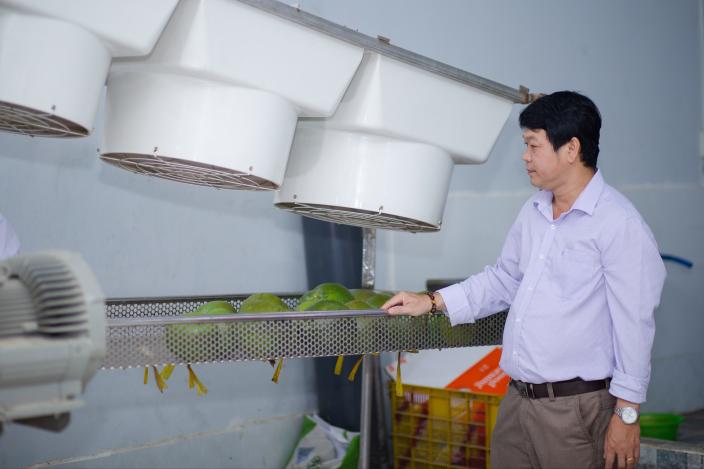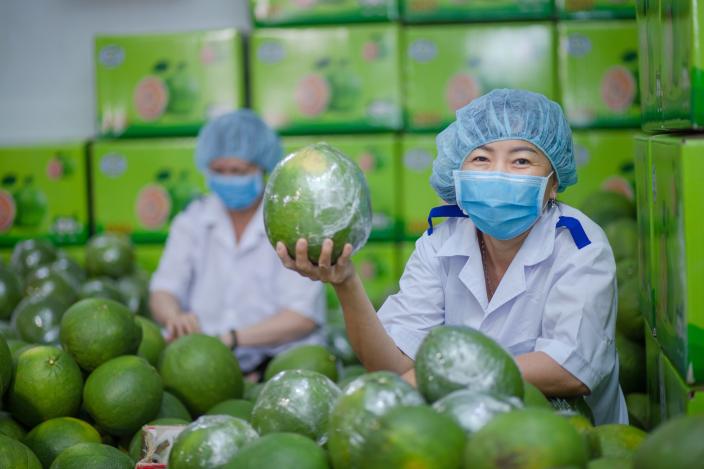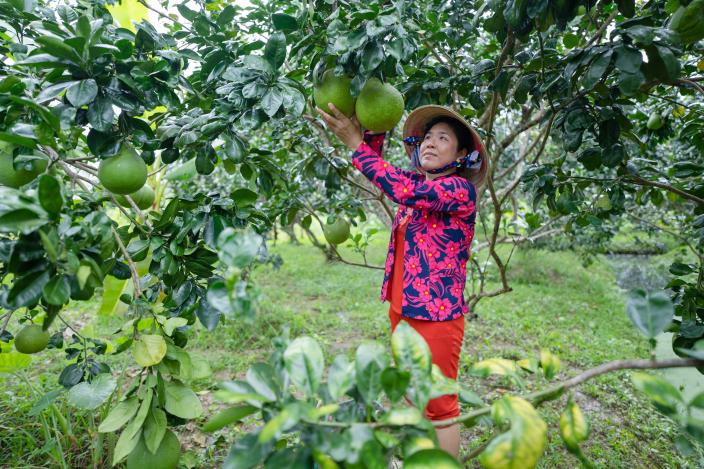“Farmers are not complicated to work with at all, they don’t care if you are the president, a director, or an engineer, as long as you can show them that doing business with you brings them better benefits than what they have done themselves, they will aut”
Nguyen Van Lanh claims to be particularly picky when it comes to choosing a business partner. “It’s like finding a wife, you must find someone honest,” the tan-skinned farmer said of his vision of ideal companionship as he sat by a water-filled ditch in the middle of his pomelo garden.
As a person who has “loads of orchards” (five to be exact, totalling 2ha), the 41-year-old was too used to being “chased after all the time” by fertiliser and plant protection sellers, promising bumper harvests of the fruits. He is also a reputable farmer in May Islet, a fertile strip of land clinging on the southwestern edge of Vinh Long province, a boat ride from Can Tho city and Hau Giang province. “Everyone here knows me well; they listen to me,” he said.
For that reason, Lanh showed indifference when “some director” named Nguyen Hoang Cung from the other side of the Bassac river approached him in 2018, proposing to sell a biofertiliser called “Bio King” (Vua Vi Sinh) for his pomelo garden. What was more, Cung committed to buy the yields at high prices. “Very few people were willing to guarantee purchasing like that,” Lanh admitted, “but what if I followed him and ruined the orchards, and then he just vanished?” He and his neighbours have heard cautionary tales of scores of farmers across the country getting deceived by ghost businesses and individual scammers. They were promised purchases of their yields as long as they used the “partners’” products, only to find thebuyers later disappeared, especially when the prices fell or the crops failed. On the other hand, many companies also complained that they could not keep farmers committed to the agreement and prescribed farming methods, or prevent them from selling the yields to other traders when the prices were high.
Empty promises and broken trust have hampered partnership potential for both sides. It took Hoang Cung and his team months to get a nod from Lanh to try the Bio King compost on one of his patches. In only 25 days, the grower recalled, he saw the difference. The pomelo variety he grows, the local specialty of Nam Roi, bears fruits year-round, allowing growers to harvest once every 20 or 30 days. Lanh noticed that compared to the time he used regular chemicals, the batch that followed was juicier and heavier, while the skin was thinner and the shell was glossier, with fewer so-called “chicken-pecked marks” - a disease that causes “blotchy scars” on the outside of the fruits. Engineers dispatched by the company visited his orchard every week, answering all his questions, instructing him on the dosage and timing of fertiliser application, or how to cure unusual ailments affectingthe plants.
The last factor leading to the ultimate handshake was that his yield was purchased by Hoang Cung’s Dai Thuan Thien fruit company at a price one-and- a-half times higher than the market price. “Cung always stays with the high prices when we do business, not letting them go up and down, nor pressuring us to lower them like others,” Lanh said, reflecting on the time when he had to carry pairs of pomelo baskets on his motorbike to a local trader 7km from his house. After a few rounds of these attempts he decided to continue the cooperation with Cung and his companies beyond seasonal and annual time horizons. They expanded it to include not only pomelo but also jackfruits, durians, and seedless lemons. The income from all of his five fruit patches, as Lanh calculated, more than doubled.

Selecting grapefruit for exporting
“Farmers are not complicated to work with at all,” said Hoang Cung. “They don’t care if you are the president, a director, or an engineer, as long as you can show them that doing business with you brings them better benefits than what they have done themselves, they will automatically commit to you.” With the backgrounds of a farmer and a scientist, Cung believed he had an answer to farmers’ suspicions. If a farmer is already yielding 10, he added, the company has to help them reach 12, and even 15.
When Lanh’s neighbours in the May Islet found him growing a sweeter pomelo and a durian with thicker pulps, they quickly showed up at his house to ask for the tricks. And from the first three farmers who dared to bet on the bio-experiment, within a year the islet brought 15 more people on board.
Together, they are now one of the satellites in a spreading network in the Mekong Delta that Hoang Cung built over the years for his two businesses, which he founded and currently runs: Bio King Producing Trading Service Company Limited and Dai Thuan Thien Safe Agricultural Products Co., Ltd.. Headquartered in Can Tho city, the capital of the Mekong Delta, the companies coordinate with a group of trusted partners whose farms are provided with biofertiliser and technical support. They agree to limit the use of inorganic materials for the soil and are forbidden from spraying them on the plants. When harvested, the fruits, which are higher quality and safer than non-organic agricultural products, are bought at high prices by Dai Thuan Thien, which in turn sells them domestically and exports them abroad.

Workers at Dai Thuan Thien factory
The model brings in high profit margins: participating farmers estimate their fertiliser costs are reduced by 70% compared to previous inorganic use, while the produce is always purchased for at least VND4,000 more than the market price for each kilogram of the fruits. As of now, about 300 farming households in the Mekong Delta and the Central Highlands have joined in. They are both Bio King’s clients and Dai Thuan Thien’s suppliers.
It took Hoang Cung and his team nine years to make the guaranteed purchase model work, starting with the Bio King product which he dubbed “the necessary condition.” As a former lecturer at Can Tho University before diving into the trade, Cung explained that crops are “just like the human body,” and biofertilisers provide the primary nutrients to boost their growth and immunity, “like our basic diets of vegetables, meat, and fish that we consume.” They do not replace “supplemental food” like compost or synthetic fertilisers and pesticides, which should still be used only with the right dosage. But they help reduce reliance and their microorganisms make the host plants stronger and restore the soil.
This approach, he said, both meets the quantitative question that organic agriculture has left open, and guarantees the safety that the abuse of chemicals in the field can threaten. “Each production caters to a certain segment in the market.” Cung concluded. “I am not saying one is better than the other. Everything has its place and it depends where each business chooses to stand.”
From the foundation of local bio-agriculture Bio King has established, Cung set up Dai Thuan Thien quality fruit brand. While the bio-products and its technical support staff ensure growers high and chemical-safe yields, the fruit selling company is the reliable buyer to secure the long-haul cooperation. Established in 2015, this business arm aims to become the country’s top supplier of safe and high quality fruit.
Since 2020, Dai Thuan Thien has started looking for clients outside of Vietnam. A few containers of mangos and pomelos sent as samples to “difficult” markets in Japan, the U.S. and Europe have received positive signals so far. Hoang Cung has been in talks with several potential retailer partners and expects to close some deals in 2021. In the meantime, a 1,000m2 factory that can churn out two containers of export goods a day was taking shape in the outskirts of Can Tho city, a massive jump from a small Dai Thuan Thien store in the early days.
Catering to both farmers and consumers can pose great challenges for the director. As he saw it, it took a competent operating system and a broad and viable strategy to balance between the grower and consumer networks in the risk-prone industry. That was even more crucial when the company sailed into the bigger, rougher waters. Hoang Cung on the other hand was no professional financier nor experienced investor. “In the past, I thought it was simply about buying and reselling the goods and right away making some money in the process,” he admitted. It was a different story when dealing with bigger orders and faraway customers. “You cannot expect instant trust and money,” he observed. “That was when I felt the heat of managing the cash flow and had to look deeper into terms like capital turnover.”
At such times, he would “pick up the phone to ask the teachers,” or the consultants from the EFD program. Joining the program in 2017, and later participating in various training courses and mentoring packages tailored to his business, Cung has gained business management wisdom from the coach and other participating companies. Their analysis and experiences recently helped him to shift his strategy, from focusing merely on the quantity to planning his sales well in advance and paying more attention to the timing as well. “I came to realise that the survival of an enterprise lies in operating the cash flow,” he said, “like the life-blood running in the human body. It is about understanding when you should sell things fast and when to pace it slowly according to the market dance, rather than just churning the goods out as much as you can.”
Even when the Covid-19 pandemic swept in and clogged international trade, Hoang Cung saw new opportunities emerging on the horizon. The disease was a wake-up call for everyone to take better care of their health and their immune system, he said. And people have been talking more about steering their lifestyle and diets in a way that respects nature. “It is always hard to change consumers’ awareness,” Cung said, “and now the pandemic has done the job for us.”
Since the outbreak, Dai Thuan Thien received visits from more and more interested importing partners. Investors also began to see the potential of the business. “We have now gotten to the phase where we select partners carefully, choosing farmers and buyers who could go far with us.” His investment in the factory expansion, he believed, promised to compensate for the sales that stopped at VND12 billion in 2020. His team at the same time was gearing up to expand the supply network from 150 Bio King sellers and grower groups.
“Cung said that the safe fruit is being favoured by customers and can be exported overseas,” Lanh said while reflecting on the future of his fruit. “That’s why we need to be extra careful when tending the plants. One bad apple could ruin everyone’s effort.” To be sure, two years after the trial, before the 2020 Lunar New Year, Lanh formed a cooperative, which gathered 40 May Islet growers who committed to Cung’s companies. “Many more wanted to join,” Lanh said, “after seeing that our plants bear great yields and our health has improved.” He continued, “But I want to keep this alliance at 40 households first. I’m working with Cung slowly but surely, and when things get really settled, we can add more members. That is what I call doing business responsibly.”
Phuong Nhung
